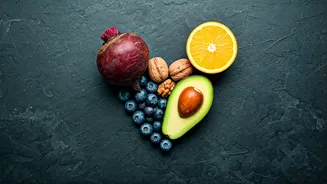Garlic: The Heart's Defender
Garlic, a culinary staple, also serves as a potent ally for your cardiovascular system. This pungent bulb has been shown to reduce LDL cholesterol levels,
often referred to as 'bad' cholesterol, thus helping to prevent the buildup of plaque in the arteries. Studies indicate that regular garlic consumption can also lead to a modest decrease in blood pressure, offering an additional benefit for heart health. Furthermore, garlic possesses antioxidant properties, helping to protect blood vessels from damage caused by free radicals. Incorporating garlic into your diet is simple: add it to your cooking, take it as a supplement, or even consume it raw, though its strong flavor might not appeal to everyone. This versatile food offers significant benefits, especially when consumed regularly, making it a valuable addition to your heart-healthy lifestyle. The key is consistent use to harness its full potential.
Fatty Fish: Omega-3 Power
Fatty fish, such as salmon, mackerel, and sardines, are rich sources of omega-3 fatty acids, which are crucial for heart health. These essential fatty acids are known for their ability to lower triglycerides, a type of fat in your blood, and reduce the risk of blood clots. Additionally, omega-3s help to reduce inflammation throughout the body, including the arteries, contributing to overall cardiovascular well-being. They can also slightly improve blood pressure, further benefiting heart health. The American Heart Association recommends eating at least two servings of fatty fish per week to reap these benefits. If you're not a fan of fish, consider taking an omega-3 supplement; however, it's always best to obtain nutrients from whole foods whenever possible. By regularly including fatty fish in your diet, you're investing in the long-term health and function of your heart.
Olive Oil: The Mediterranean Secret
Olive oil, a cornerstone of the Mediterranean diet, has been linked to numerous health benefits, including a reduced risk of heart disease. Its heart-healthy effects are primarily attributed to its high content of monounsaturated fats, which can help to lower LDL cholesterol levels. Olive oil also contains antioxidants that protect blood vessels from damage and reduce inflammation. Extra virgin olive oil, in particular, is rich in these beneficial compounds. Use olive oil as a cooking oil, a salad dressing, or a flavorful addition to your meals. Make sure to choose a high-quality product, as the processing methods can affect the nutritional value. The consistent use of olive oil, alongside a balanced diet, can contribute significantly to better heart health. Remember, incorporating olive oil into your diet can be a delicious step toward a healthier heart.
Berries: Nature's Antioxidants
Berries, including blueberries, strawberries, and raspberries, are packed with antioxidants, especially anthocyanins, which give them their vibrant colors. These antioxidants help to protect the heart by reducing oxidative stress and inflammation within the body. They can also improve blood vessel function and lower blood pressure. Regular consumption of berries has been linked to a lower risk of heart disease and improved overall cardiovascular health. Aim to incorporate a variety of berries into your diet regularly. You can add them to your breakfast cereal, blend them into smoothies, or enjoy them as a snack. Fresh, frozen, or even dried berries can all provide these benefits. The antioxidants found in berries are a powerful defense against heart disease. Remember, including berries in your diet is both delicious and beneficial for your heart.
Nuts: Healthy Snack Choice
Nuts, such as almonds, walnuts, and cashews, are another excellent food group for heart health. They are rich in healthy fats, fiber, and various vitamins and minerals. Regularly consuming nuts can help to lower LDL cholesterol levels, reduce inflammation, and improve blood vessel function. The type of fat found in nuts is primarily monounsaturated and polyunsaturated, which are beneficial for heart health. However, nuts are calorie-dense, so it's essential to eat them in moderation. A small handful (approximately 1 ounce or 28 grams) per day is a reasonable serving size. You can add nuts to your salads, enjoy them as a snack, or incorporate them into your meals. Nuts offer a convenient and nutritious way to support heart health. By consuming nuts, you can improve heart health. Remember to choose unsalted nuts to avoid excess sodium.





















